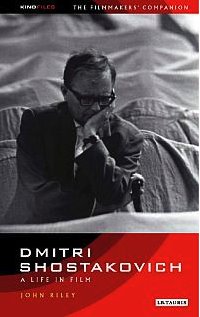
 Last night's WEA Film Club at Clapham Picturehouse was great fun and the films were about as big a set of contrasts as you could imagine.
Last night's WEA Film Club at Clapham Picturehouse was great fun and the films were about as big a set of contrasts as you could imagine.Mirror Mirror from Alan Walsh on Vimeo.
EXHUMATION from Rebecca Feiner on Vimeo.
Film. Music. Russian, Soviet and East European. Avant-garde. Other stuff that interests me.

 Last night's WEA Film Club at Clapham Picturehouse was great fun and the films were about as big a set of contrasts as you could imagine.
Last night's WEA Film Club at Clapham Picturehouse was great fun and the films were about as big a set of contrasts as you could imagine.Mirror Mirror from Alan Walsh on Vimeo.
EXHUMATION from Rebecca Feiner on Vimeo.



 his will be about the fourth score I'll have heard for it but if Neil Brand's past scores are anything to go by, it should be good.
his will be about the fourth score I'll have heard for it but if Neil Brand's past scores are anything to go by, it should be good. Master of Suspense, though the selection of titles is a bit random: Champagne (1928), two Blackmails (1929), Murder (1930) and its German-language equivalent Mary [Mord - Sir John greift an] (1931), Rich and Strange (1931) Foreign Correspondent (1940), Suspicion (1941) and Under Capricorn (1949).
Master of Suspense, though the selection of titles is a bit random: Champagne (1928), two Blackmails (1929), Murder (1930) and its German-language equivalent Mary [Mord - Sir John greift an] (1931), Rich and Strange (1931) Foreign Correspondent (1940), Suspicion (1941) and Under Capricorn (1949). 


The short story is that our ex-partner and landlord, Mr Amin Taha, has reneged on an existing agreement to enter into a new lease, at market rate, at our premises at 171 Westbourne Grove, Notting Hill, and has re-taken possession of the premises with a view to sell the entire building as vacant and without an existing tenant in situ. As Cinéphilia West was occupying the premises under a temporary arrangement ahead of the formal execution of a long-term lease we have no choice but to cease operation there and seek alternative premises for our business. This is with immediate effect, as no notice was given but bailiffs imposed to re-possess the premises, leaving us completely exposed to the damage to our reputation as though the business itself was not viable or successful, which it was, and giving the impression that we are in any way at fault, which we are not. We have been torpedoed by a very unscrupulous man, but do not have the substantial means to challenge his behaviour through legal channels, despite having the full force of the law in our favour.

